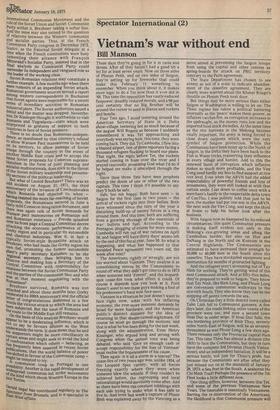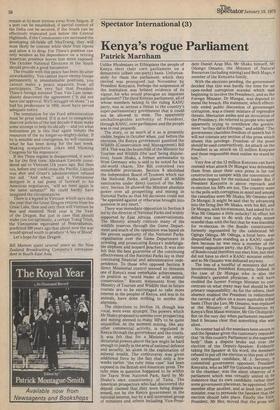Vietnam's war without end
BM Manson
These days they're going in for it in twos and threes. After all they haven't had a good tet a tet for at least seven years. Now on three sides of Phnom Penh, and on two sides of Saigon, they're setting up for fireworks that could make this February 11 something to remember. When you think about it, it makes more logic to do a Tet now than it ever did in '68. This time the opposition has vastlyreduced firepower, steadily reduced morale, and a 99 per cent certainty that no Big Brother will be around the corner to send in i;lanes and rockets and bombs.
Four Tets ago, I stood teetering around the American Secretary of State in a Delta show-village, teetering not so much because of the august Will Rogers as because I suddenly remembered it was Tet approaching and everybody was saying how, this time, they were . coming back. They did. To Cambodia. I flew into . a blasted airport, one of three reporters facing a thousand refugees flocking to board our plane. That night, the night before Tet, the rockets started coming in from over the river and I prayed raucously, promising God what I'd do if he helped me make it unscalped through the night. Since then three Tets have seen prophets predict the doom of one or other of the two capitals. This time I think it's possible to say they'll both be safe. Safe, but not happy. Both have seen — in Saigon for the first time in two years — the arrival of rockets right into their bellies. Both have witnessed since the turn of the year a disturbing build-up of enemy forces in a ring around them. And this time, both are suffering from a growing shortage of the essentials of war: bullets and fuel. According to the Pentagon, plugging of course for more money, Cambodia will run, out of war rations on April 30, and Saigon will have thirty days' ammo left by the end of this fiscal year, June 30. So what is happening, and what has happened to that heralded Peace agreement two years old, the week after next?
The Americans, rightly or wrongly, are not too worried about Vietnam. They analyse it as consolidating moves by the Communists to round off what they didn't get time to do in 1973 when someone said 'Freezer, and the leopard spot cease-fire took what effect it could. Of course it depends how you look at it. Ford doesn't want to see these guys making a fool of his predecessor's hard won face-save. Vietnam is a situation he just doesn't want to face right now, what with his inflating economy, the ever-more insistent demands by Israel for more hardware, and the American public's distinct distaste for the idea of returning to that dream-turned-nightmare. Of course he must go through the motions, and that is what he has been doing for the last week, along with the administration. Even Henry Kissinger, who argued long and strong with Congress when the annual vote was being
debated, who said 'Give us enough cash or accept responsibility for the loss of Vietnam' must realise the hopelessness of his cause.
Then again: is it all a storm in a teacup? The cease-fire of two years ago was, unlike 1954, of the Leopard Spot variety, with all forces freezing exactly where they were when someone blew the whistle. If they couldn't be achieved before, the regrouping and local rationalisings would inevitably come after. And so there have been the constant nibblings with each side trying to make what it has safe to live in. And even last week's capture of Phuoc Binh was explained away by the Vietcong as a move aimed at preventing the Saigon troops from using the capital and other centres as spring-boards for attack on PRG territory contrary to the Paris agreement.
The State Department has chosen to see events as not of a scale to indicate abandonment of the ceasefire agreement. They are clearly more worried about the Khmer Rouge's throttle on Phnom Penh next door.
But things may be more serious than either Saigon or Washington is willing to let on. The Thieu regime has taken a political battering internally as the 'peace' makes them poorer, as inflation catches fire, as corruption increases in the updraught, as the money runs low and the imported food stock dwindles. At the same time as the rice harvests in the Mekong become vitally important, the army is being forced to close down outposts which were the very symbol of Saigon protection. While the Communists have been noisy up to the North of Saigon, in the Delta they have been back to the Fish in Water tricks, reasserting their influence in every village and hamlet. Add to this the renewed burst of corruption which inflation makes so much more profitable, and the Viet Cong need hardly say boo to find support at rice root level. Even when the ARVN had the added respectability of powerful friends and lots of armaments, they were still looked at with that certain smile. I sat down to coffee once with a merchant's family in the respectable delta town of CanTho. I was politely told that just to be sure, the mother had put one son in the ARVN, the next with the Viet Cong, and kept the third at home to help his father look after the business.
With Saigon now so hampered by its reduced circumstances, this quiet Communist pressure is making itself evident not only in the Mekong's rice-growing areas and altmg the Cambodian border, but also on Hue and DaNang in the North and on Kontum in the Central Highlands. The Communists are estimated to have increased their strength by 30,000 to 40,000 men in the South since the ceasefire. They have stockpiled equipment and ammunition for months of protracted fighting. And the refugees aren't streaming out of Tay Ninh for nothing. They're getting wind of the next Communist attack. And at fifty-five miles, they're prepared to walk to Saigon. They know that Tay Ninh, like Binh Long, and Phuoc Long are convenient communist walkways to the rice-rich South. They also know they can be the stepping-off points towards the sea. On Christmas Day a little district town called Tahn Linh fell to Communist gunners. A few days later, the roads linking other towns of the province were out, and now a second town Hoai Duc is under seige. If Hoai Duc falls, the sea-bordering province of Binh Thuy, seventy miles North-East of Saigon, will be as severely threatened as was Phouc Long a few days ago. There remains only the Provincial capital Ham Tan. This time Thieu has almost a division (the 18th) to face the Communists, but they in turn have the complete 3rd Division (North Vietnamese), and an independent battalion. It will be a serious battle, not just for Thieu's pride, but because the Communists are after what they just missed out on at the standstill of January 28, 1973: a Sea Port in the South. A seaborne Ho Chi Minh Trail? Perhaps the presence of the 7th Fleet looks a little different now.
One thing differs, however, between this Tet, and some of the previous Vietnamese New Years. The timetable is essentially Vietnamese.
Barring the re-intervention of the Americans, the likelihood is that Communist pressure will remain at its most intense away from Saigon. If a port can be established, if partial control of the Delta can be secured, if the South can be effectively truncated just below the Central Highlands, if the Communists can surround the developing oil-fields off NhaTrang, they will most likely be content while their fruit ripens and allow it to drop. For Thieu's position can only weaken as his dependence on a retiring American presence leaves him more exposed. The October National Elections in the South should provide a good barometer.
The trouble with this peace has been its utter unworkability. You cannot leave enemy troops permanently in unsustainable positions, you cannot make a peace separate from all participants. The very fact that President Thieu's foreign minister Tran Van Lam immediately disavowed the agreement ("It did not have our approval. We'll struggle on alone.") as had his predecessor in 1955, must have served adequate notice.
The temptation for the Ford administration must be great indeed. If it is not to completely disavow policies of the last decade it must make some attempt to help its old ally — and yet what bottomless pit is this that again tempts the resources of the no longer-so-mighty-dollar. If he is sensible and courageous, he will continue what he has been doing for the last week. Making sympathetic jokes and blaming Congress for his impotence.
If the Thieu regime is disappointed, it won't be for the first time. Abraham Lincoln considered aid to Vietnam 114 years ago. But then too, before any could cross the Pacific, Lincoln was shot and Grant's administration refused the aid. "And when," said a Vietnamese delegate in a sad poem of farewell to his American negotiators, "will we meet again in the same sampan?" He could hardly have imagined the circumstances. There is a legend in Vietnam which says that the year that the Great Dragon returns from his Great Lake, then and only then will Vietnam be free and reunited. Next year is the Year of the Dragon. But just in case that should make you too optimistic, a certain Trang Trinh, the Vietnamese equivalent of Nostradamus, predicted 300 years ago that about now the war would spread south to produce 'A Sea of Blood'.
Let's hope for that Dragon.
Bill Manson spent several years as the New Zealand Broadcasting Company's correspondent in South-East Asia.



































 Previous page
Previous page